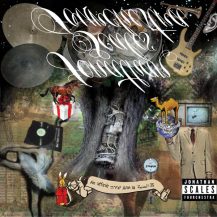Jonathan Scales Fourchestra – “Jonathan Scales Fourchestra”
The steel pan, like the banjo, the didgeridoo, and the flexatone, is an instrument that will forever be rooted in a certain genre and/or a particular region. The plinky sound of steel pans is to island music what the digital bell synth is to 90s New Age. It is meant to evoke the cool breeze […]
Grafton Tanner
6.5
out of 10
Jonathan Scales
Fourchestra
July 9, 2013
The steel pan, like the banjo, the didgeridoo, and the flexatone, is an instrument that will forever be rooted in a certain genre and/or a particular region. The plinky sound of steel pans is to island music what the digital bell synth is to 90s New Age. It is meant to evoke the cool breeze of the Caribbean, and because of such stigmas, the sound of a steel pan has been deemed kitschy and altogether “un-serious.” Pour another Piña Colada, Jimmy.
There are plenty of nods to “island music” on Jonathan Scales Fourchestra’s self-titled debut, but nowhere will you find “Margaritaville.” Scales has taken the steel pan out of the cabana and into the jazz hall, and joining him are drummer Phil Bronson and bassist Cody Wright, who has learned the tricks of the Wooten trade quite well. The Asheville trio is tight and soulful, and their arrangements illustrate the strengths of these three phenomenal musicians and their cast of horn and auxiliary players. The Fourchestra, determined to be as stylistically fluid as a traditional jazz trio even with a steel pan fronting the group, jumps from classically inspired passages to 1970s soul to contemporary hip-hop. At their grooviest (“Life After D”), the trio brings in Victor Wooten himself to provide sultry R&B grooves over Bronson’s tight in-the-pocket playing. Often times, the Fourchestra shows a quality sense of humor with cartoon inspired ditties like “Lurkin’.” It’s all very slapstick with Wright’s staccato plucking and the recognizable plink of the steel pans.
For most of the album, the novelty of the steel pans does not wear off, but the trio’s attempt at covering Seal’s “Kiss From A Rose” exposes the reality that steel pans cannot always translate to other musical genres. The track sounds thin and without the soul that is present in many of the other songs on the album (or without the soul of the original, for that matter). Some of this thinness stems from the flat production of the entire album. Even with every instrument playing, key pieces of the ensemble sound absent; the trio does very little to manipulate the sounds of the instruments in order to vary the color of the arrangements. With groups like Portico Quartet and the Bad Plus propelling jazz into extreme and eclectic musical realms, the Fourchestra winds up sonically bland.
The group successfully melds Dave Weckl fusion, Tito Puente, the Flecktones, and smooth R&B to create something unique and interesting, yet an innovative spirit is lacking. Breaking the cliché of steel pans as the identifying voice of background island music is no easy feat, and the Fourchestra should be applauded for undertaking such a risky task on their debut. However, the risk itself is not enough. The end result is an album with a lot of funk and very little of the restless experimentation of jazz.
-Grafton Tanner, July 29, 2013